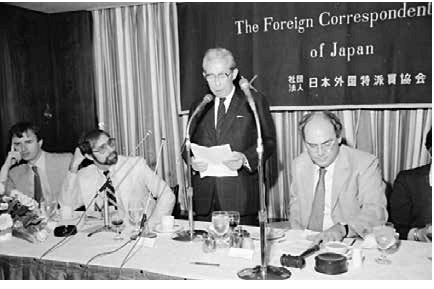Issue:

Haruo Maekawa, Governor of the Bank of Japan, reads from his prepared notes at a professional luncheon on May 26, 1983. Seated to his left is FCCJ President Karel van Wolferen (NRC Handelsblad), and to his right are a bearded Urban Lehner (Wall Street Journal) and Hamish McDonald (Sydney Morning Herald). Later tasked by Prime Minister Yasuhiro Nakasone with preparing a plan for restructuring Japan’s economy to bring it more in line with its trading partners in the West, Maekawa and members of his advisory group announced recommendations in 1986 that received positive reviews overseas and negative criticisms in Japan. In his 1989 book, The Enigma of Japanese Power, van Wolferen cited the restructuring efforts of the Maekawa Commission as an example of Japanese government paralysis, while later stating that Maekawa was not at fault and remained highly respected.
Born in Tokyo in February of 1911, at the very end of the Meiji Period, Haruo Maekawa witnessed in their entirety Japan’s Taisho and Showa eras. After his graduation from Tokyo Imperial University in 1935, he joined the Bank of Japan, working in Italy, Germany, and New York as a specialist in international finance. In 1974 he was elevated to Deputy Governor of the Bank of Japan (BOJ) and then became its 24th Governor in 1979. Of note was his work with Finance Minister Noboru Takeshita in reaching a 1980 international agreement in which Japan received petrodollars from Saudi Arabia in return for Japanese government bonds, as reported by our own Junnosuke Ofusa of the New York Times.
Haruo Maekawa resigned as BOJ Governor in 1984 to become chairman of an advisory group on economic restructuring. The so-called “Maekawa Report” of 1986, calling for open markets and expanding domestic demand, foundered for the most part in Japan because it was considered too radical. He retired that year and became Chairman of KDDI (Kokusai Denshin Denwa). He died on Sept. 22, 1989, at the age of 78.
Karel van Wolferen now spends most of his time in the Netherlands, where he is an emeritus professor, and writes about geopolitical developments. Hamish McDonald and Urban Lehner both continued their careers in journalism.
– Charles Pomeroy,
editor of Foreign Correspondents in Japan,
a history of the Club that is available at the front desk

